What Are Managed IT Services?
What is Managed IT Services?
Managed IT Services involve delegating IT tasks and operations to a third-party provider, known as a Managed Service Provider (MSP). This strategic move allows businesses to offload general yet critical IT tasks, ranging from routine maintenance to more complex, strategic initiatives. The essence of managed services lies in its ability to reduce costs, elevate service quality, and enable internal teams to focus on core business functions rather than getting entangled in day-to-day IT management tasks.


Managed IT Services are not just a luxury for large corporations but a strategic asset for businesses of all scales, including startups and well-established enterprises. Here are some compelling benefits:
- Filling the Skills Gap: Not every business has the luxury of a dedicated in-house IT team with expertise in all areas of technology. Managed IT Services bridge this gap, providing access to a pool of experts who can manage complex IT functions, allowing your team to concentrate on innovation and core business strategies.
- Cost Savings: Managed IT Services can significantly reduce overheads associated with staffing, training, and maintaining an in-house IT team. With pricing models often based on fixed monthly charges, businesses can enjoy predictable IT spending, aiding in more accurate budgeting.
- Reliability and Uptime: Managed IT Services come with Service Level Agreements (SLAs), ensuring that your IT infrastructure is monitored, maintained, and supported round the clock. This level of reliability is paramount in today’s 24/7 business environment.
Managed IT Services cover a broad spectrum, from basic monitoring and maintenance to more sophisticated and comprehensive IT system management. These services can include:
- Remote monitoring and management of servers and networks
- IT systems management
- IT support
- Patch management and predictive maintenance
- Security services, including monitoring and management of both traditional infrastructure and cloud-based systems
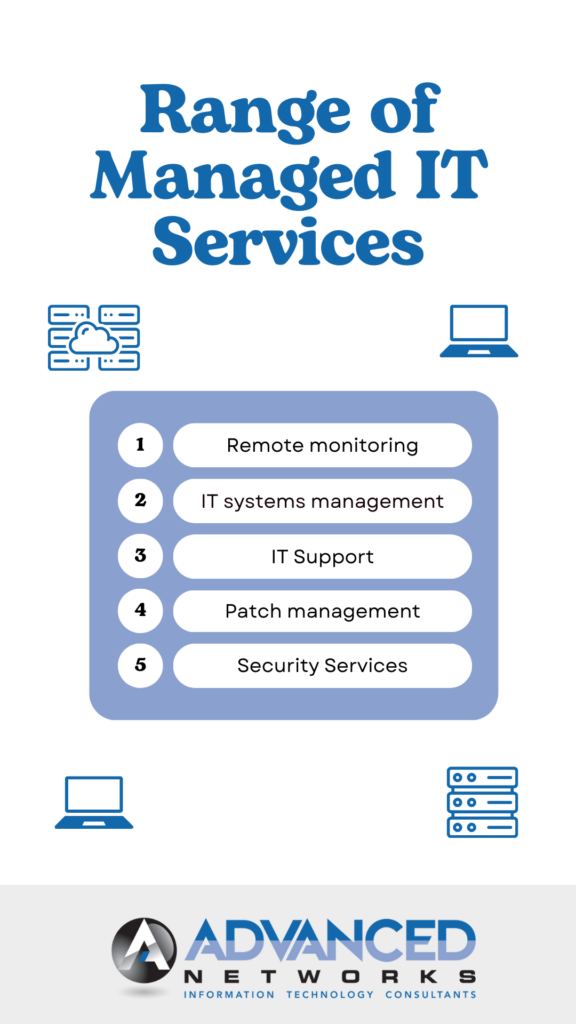
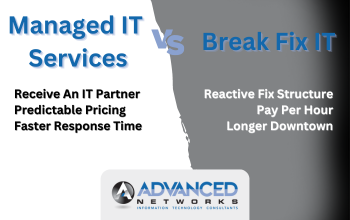
Gone are the days when managed services were synonymous with a reactive “break/fix” model. Today’s MSPs adopt a proactive stance, focusing on preventing issues before they disrupt business operations. This includes regular updates, security patches, and predictive maintenance, ensuring the longevity and reliability of IT systems.
It’s crucial to distinguish between “managed IT services” and “cloud services,” as these terms are often used interchangeably yet have distinct meanings. Cloud services refer to on-demand software, platform, or infrastructure services managed by vendors and delivered over the internet. Managed IT Services, on the other hand, often encompass the management of cloud platforms and services as part of their offerings, providing a more holistic approach to IT management.
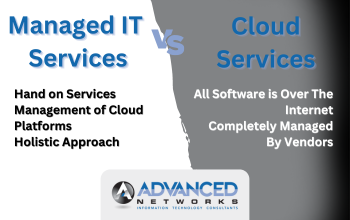
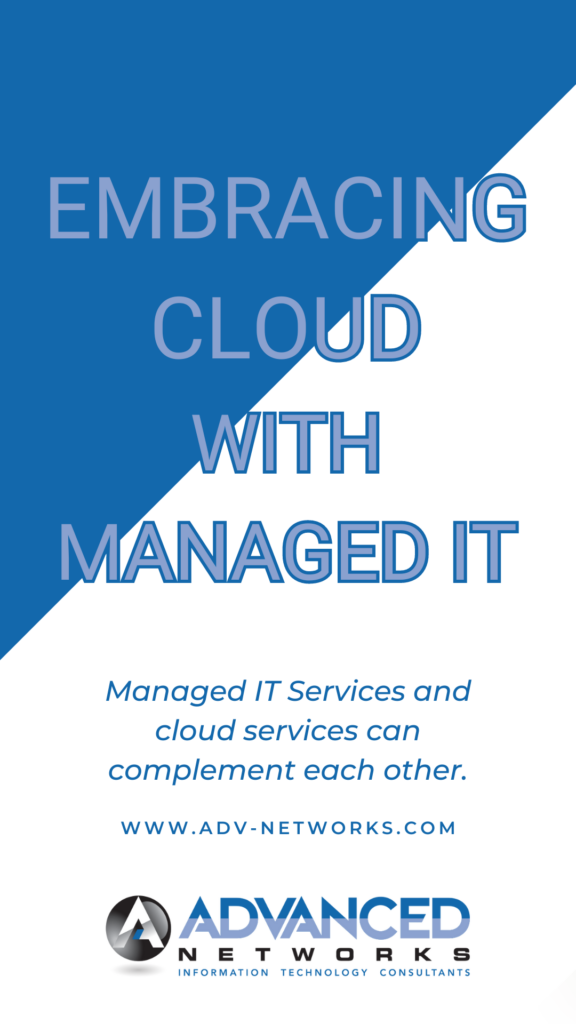
Managed IT Services and cloud services can complement each other. Many MSPs offer cloud-based managed services, which can include everything from Software as a Service (SaaS) to Infrastructure as a Service (IaaS) and Platform as a Service (PaaS). These services enable businesses to scale rapidly, access advanced analytics, and reduce the costs associated with traditional datacenter and IT infrastructure management.
As we delve deeper into the world of Managed IT Services, it’s important to recognize the transformative impact these services can have on a business’s operational dynamics, security posture, and innovation capabilities.
In an era where cyber threats loom larger than ever, Managed IT Services play a crucial role in bolstering a company’s security defenses. MSPs like Advanced Networks provide managed security services that encompass a comprehensive suite of security measures tailored to protect both traditional and cloud-based infrastructure. This is particularly vital for businesses with hybrid cloud environments, where the complexity of security requirements is significantly higher.
Managed security services include regular security assessments, threat monitoring, incident response, and compliance management. These proactive measures ensure that businesses not only stay ahead of potential threats but also adhere to industry regulations and standards, safeguarding sensitive data and maintaining customer trust
Managed security services include regular security assessments, threat monitoring, incident response, and compliance management. These proactive measures ensure that businesses not only stay ahead of potential threats but also adhere to industry regulations and standards, safeguarding sensitive data and maintaining customer trust.
As we delve deeper into the world of Managed IT Services, it’s important to recognize the transformative impact these services can have on a business’s operational dynamics, security posture, and innovation capabilities.
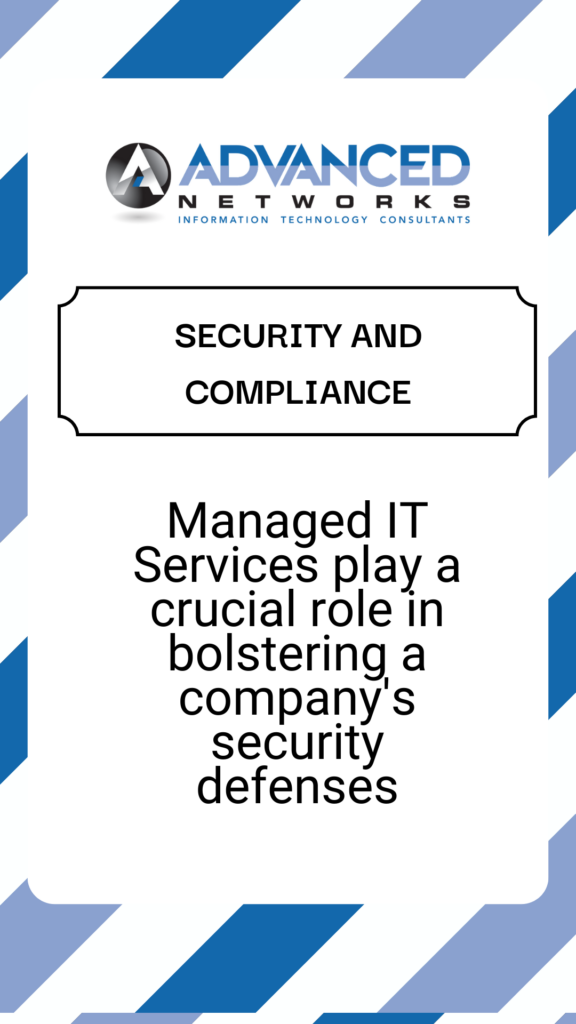
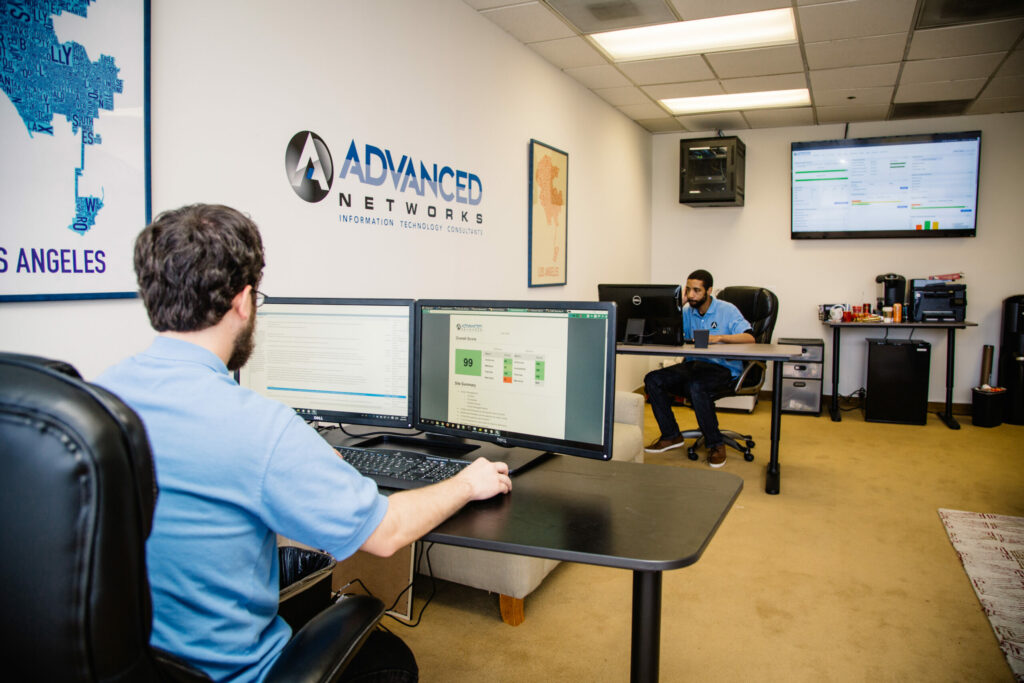
Managed IT Services go beyond mere troubleshooting and maintenance. They involve a strategic component where MSPs work closely with businesses to understand their long-term goals, challenges, and industry dynamics. This collaborative approach enables the development of customized IT strategies that align with the business’s objectives, driving growth and fostering innovation.
For instance, an MSP can help a business implement scalable IT solutions that support expansion into new markets or introduce efficiencies through automation and cloud integration. By leveraging the expertise and resources of an MSP, businesses can embark on digital transformation initiatives that would otherwise be out of reach due to cost or complexity constraints.
Managed security services include regular security assessments, threat monitoring, incident response, and compliance management. These proactive measures ensure that businesses not only stay ahead of potential threats but also adhere to industry regulations and standards, safeguarding sensitive data and maintaining customer trust
Managed security services include regular security assessments, threat monitoring, incident response, and compliance management. These proactive measures ensure that businesses not only stay ahead of potential threats but also adhere to industry regulations and standards, safeguarding sensitive data and maintaining customer trust.
As we delve deeper into the world of Managed IT Services, it’s important to recognize the transformative impact these services can have on a business’s operational dynamics, security posture, and innovation capabilities.
At the heart of Managed IT Services is the partnership between businesses and their MSP. This relationship is built on trust, communication, and a shared commitment to achieving the business’s objectives. MSPs like Advanced Networks place a strong emphasis on understanding their clients’ unique needs and challenges, fostering a relationship that extends beyond the traditional vendor-client dynamic.
The human element also manifests in the expertise and experience that MSPs bring to the table. With a team of seasoned IT professionals, businesses have access to a wealth of knowledge spanning various technology domains. This expertise is invaluable in navigating the complexities of modern IT environments and ensuring that businesses can leverage the latest technologies effectively.
For instance, an MSP can help a business implement scalable IT solutions that support expansion into new markets or introduce efficiencies through automation and cloud integration. By leveraging the expertise and resources of an MSP, businesses can embark on digital transformation initiatives that would otherwise be out of reach due to cost or complexity constraints.
Managed security services include regular security assessments, threat monitoring, incident response, and compliance management. These proactive measures ensure that businesses not only stay ahead of potential threats but also adhere to industry regulations and standards, safeguarding sensitive data and maintaining customer trust
Managed security services include regular security assessments, threat monitoring, incident response, and compliance management. These proactive measures ensure that businesses not only stay ahead of potential threats but also adhere to industry regulations and standards, safeguarding sensitive data and maintaining customer trust.
As we delve deeper into the world of Managed IT Services, it’s important to recognize the transformative impact these services can have on a business’s operational dynamics, security posture, and innovation capabilities.


As technology continues to evolve at a breakneck pace, the role of Managed IT Services will become increasingly integral to business success. The advent of emerging technologies such as AI, IoT, and blockchain presents new opportunities and challenges for businesses. MSPs will play a pivotal role in helping businesses harness these technologies, ensuring they can innovate and compete in an ever-changing digital landscape.
Moreover, the shift towards more complex, hybrid IT environments will further underscore the value of Managed IT Services. Businesses will rely on MSPs to navigate this complexity, ensuring seamless integration, security, and scalability across their IT ecosystems.
The human element also manifests in the expertise and experience that MSPs bring to the table. With a team of seasoned IT professionals, businesses have access to a wealth of knowledge spanning various technology domains. This expertise is invaluable in navigating the complexities of modern IT environments and ensuring that businesses can leverage the latest technologies effectively.
For instance, an MSP can help a business implement scalable IT solutions that support expansion into new markets or introduce efficiencies through automation and cloud integration. By leveraging the expertise and resources of an MSP, businesses can embark on digital transformation initiatives that would otherwise be out of reach due to cost or complexity constraints.
Managed security services include regular security assessments, threat monitoring, incident response, and compliance management. These proactive measures ensure that businesses not only stay ahead of potential threats but also adhere to industry regulations and standards, safeguarding sensitive data and maintaining customer trust
Managed security services include regular security assessments, threat monitoring, incident response, and compliance management. These proactive measures ensure that businesses not only stay ahead of potential threats but also adhere to industry regulations and standards, safeguarding sensitive data and maintaining customer trust.
As we delve deeper into the world of Managed IT Services, it’s important to recognize the transformative impact these services can have on a business’s operational dynamics, security posture, and innovation capabilities.
Managed IT Services represent a strategic partnership, allowing businesses to leverage advanced IT capabilities without the overhead of managing complex systems in-house. Whether it’s filling the skills gap, ensuring cost efficiency, or maintaining high reliability and uptime, Managed IT Services from providers like Advanced Networks can empower businesses to focus on their core competencies and drive growth.
When you reach out to us, we connect you with an experienced account manager who will walk you through how we can improve your network infrastructure. Embracing managed services means not just outsourcing IT tasks but entering a collaborative relationship that propels your business forward in the digital era. Learn more about our latest managed IT services in Los Angeles today.


